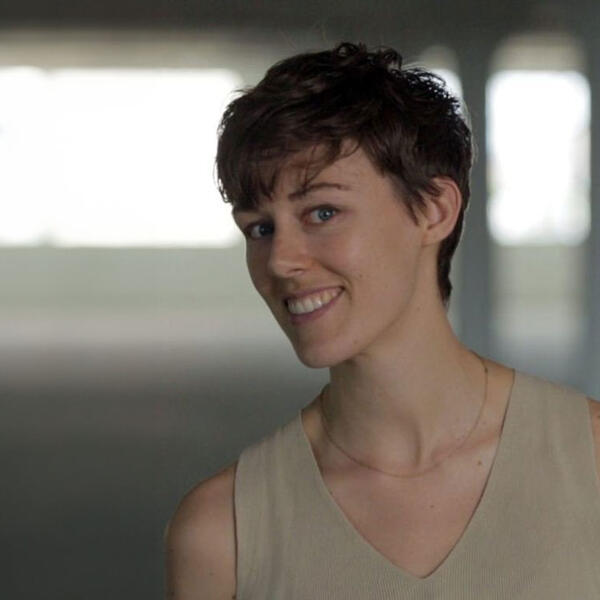
What does “world building” have to do with treating the future as a design space?
My approach to world-making reflects the fact that one consequence of post-medium and, increasingly, post-studio art production is that artists are required to not only make projects but also develop critical, social, and aesthetic contexts in which those projects can circulate, often by utilizing digital media.
While my practice is often sculptural, the objects I build always come with a network in which they can circulate, that others can join, where new meaning and possibilities may accrue. For example, I created a utilitarian dress for femme construction workers (Work Dress, 2007), which was available for barter only. Simultaneously, I brought together a team of computer engineers, designers, and cultural equity activists to found OurGoods.org, an online platform that facilitated non-monetary exchanges among artists, designers, and craftspeople. This site was used by over ten thousand people online for eight years and received a Rockefeller Cultural Innovation Fund award as well as multiple graphic design awards. This led to the founding of a Web 2.0 peer-to-peer platform that supports self-organized learning spaces that run on a barter system — TradeSchool.coop — active in thirty cities internationally, including New York City, Athens, Pietermaritzburg, Glasgow, and Quito.

Caroline Woolard, Capitoline Wolves, installation view at the Knockdown Center, New York, 2016-2018, cherry wood, powder coated steel, dyed stoneware, local water, hand mirrored glass, copper bowls, performance, 29" × 36" × 72" each, forming a circle
If enjoining objects to contexts of circulation is important to the future of arts production, then for such a shift to be embraced at the level of the arts field and of arts education, the subjectivities of the artist, designer, and technologist must change.
As someone who attends and who facilitates many meetings in the process of creating multi-year projects, I began to ask: What if the tables and objects in our spaces were as imaginative as the conversations we are having? I know that many of my multi-year initiatives have been limited in their depth by members’ lack of experience with collaboration, listening, and group work. I have been in so many self-organized groups where communication breaks down; where people focus on logistics and strategy rather than the interpersonal skills of listening, communication, and conflict transformation.

Caroline Woolard, Water Clock, performance, 2017, porcelain and water, 8" × 2" × 2", courtesy of the artist, Photo: Levi Mandel.
I have found that by bringing sculptural objects, like my Capitoline Wolf tables and my Water Clock timekeeping devices, to gatherings, I can make tangible the slow temporality of community-building, and help people sense the care that has gone into the facilitation practices that are necessary for group work. I am making objects for facilitation because this approach to socially engaged work connects two deep desires I have: (1) to create sculptural objects and (2) to remain in facilitation trainings, meetings, and group settings where I can contribute my skills as an artist and continue to honor existing, slowly developed, community-generated facilitation practices.
My multi-year projects establish contexts for emergent objects; this approach has gained renown across the fields of art, design, technology, and urban planning. I make objects and also contexts for the circulation of these objects. What is unusual about my approach to art-making is that I create sculptures as well as multi-year, public initiatives using both online networks and sculptural environments. I co-create open source, web 2.0 technology while also hand-building objects in immersive installations, often using CNC machines and 3D printers. I made a dress for barter only and also two international barter networks that continue to grow. I built she-wolf tables, and also convened investment platforms for community land trusts. I created sculptural objects for facilitation as I also founded a study center for group work. Together, objects and contexts create space for reflection, circulation, and social transformation.
About Caroline Woolard
Caroline employs sculptures and online networks to study the pleasures and pains of interdependence. Woolard has co-founded barter networks OurGoods.org and TradeSchool.coop (2008-2015), the Study Center for Group Work (since 2016), BFAMFAPhD.com (since 2014), and the NYC Real Estate Investment Cooperative (since 2016). Recent writing on her work has been published in The Brooklyn Rail, Artforum, Art in America, and The New York Times. Woolard’s work has been featured twice in the PBS / Art21 documentary series New York Close Up. Woolard is an Assistant Professor of Sculpture at the University of Hartford and her book about interdisciplinary collaboration, Making and Being, is scheduled for publication in the fall of 2019.